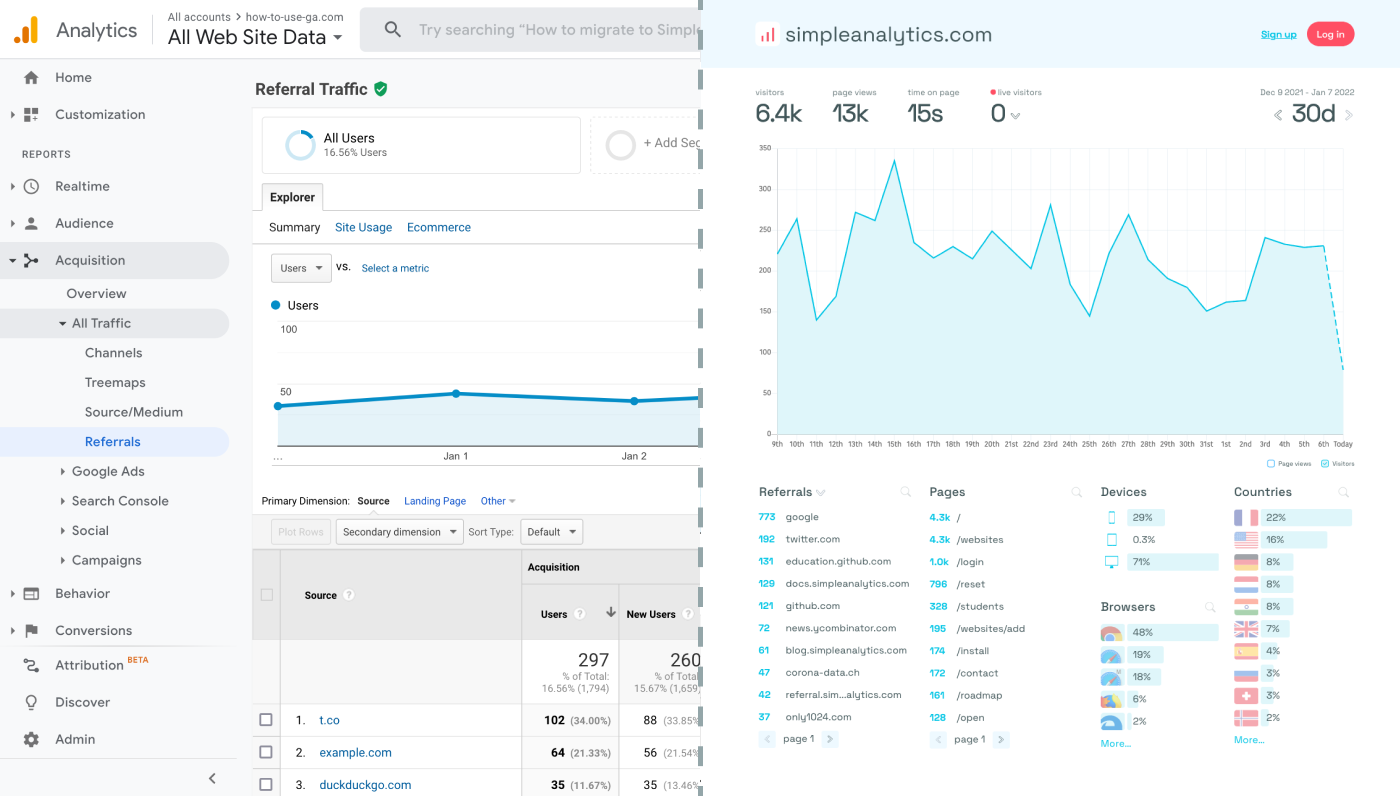A good landing page is a good start to expand your reach, but there is more to optimizing your website's performance- and Google Analytics can help. This blog post will guide you through integrating Google Analytics with your Leadpages, step by step.
Let's dive in!
- Set Up Google Analytics
- Integrate Google Analytics with Leadpages
- Verify the Integration
- Final Thoughts
Before we dig in I want to show you something. I promise it's worth it...
Google Analytics is great, but also complex and a bit clunky. If you just want a straightforward dashboard with the insights you need, GA is not a great place to start. Additionally, Google doesn't care about privacy and GA requires an annoying cookie banner.
That's why I built Simple Analytics, a privacy-friendly and simple analytics tool - no personal data, no cookies, just the insights you need in a straightforward dashboard.
Here is how it looks vs GA. Feel free to check our live analytics to get an idea for your project. (It is free btw)
All right, enough about us. Now let's get into answering your question!

Set Up Google Analytics
If you haven’t already set up a Google Analytics account for your website, you'll need to do that first. Here's a quick setup guide:
- Visit Google Analytics: Go to Google Analytics and sign in with your Google account. If you don’t have an account, you’ll need to create one.
- Create a New Property: Follow the on-screen instructions to create a new GA4 property, choosing "Web" as your platform type.
- Save Your Tracking Code: inspect your GA property to retrieve your GA tracking code.
Integrate Google Analytics with Leadpages
Leadpages simplifies the process of adding external analytics and tracking codes to your pages. Here’s how to add your GA tracking code:
- Access Your Leadpages Dashboard: Log in to your Leadpages account and navigate to the dashboard of the page you wish to track.
- Page Settings: For the specific page, click on the "Edit" button, then look for the settings or tracking section. This might be labeled as "Analytics," "Tracking," or a similar term.
- Add Your GA Tracking Code: In the section where you can add custom analytics code (often found under "Head Section Tracking Code" or "Analytics"), paste your entire Google Analytics tracking code snippet. This snippet should include your Measurement ID and is typically a JavaScript
<script>tag provided by GA. - Save and Update Your Page: After pasting the tracking code, make sure to save your changes and update or republish your page to ensure the Google Analytics tracking is active.
- (Optional) Create New Properties: if you want to track multiple websites, create a new property for each of them and use the corresponding tracking code. This allows GA to collect data separately for each website.
Verify the Integration
To ensure that Google Analytics is correctly tracking your Leadpages:
- Visit Your Page: Open your Leadpages in a browser to generate some initial data.
- Check Google Analytics: Log into your Google Analytics account and go to the "Realtime" report to see if your visit is being tracked. This immediate feedback indicates that GA is successfully collecting data from your page.
Final Thoughts
Adding Google Analytics to your website can give you great insights. However, ask yourself: is Google Analytics the right tool for you?
GA is an overpowered solution for straightforward analytics. If you're looking for a simple and intuitive dashboard with the insights you need, there are better alternatives. Yes, I’m talking about my own product (Simple Analytics), but there are others out there as well.
I hated using Google Analytics for my projects. It's clunky, there are hundreds of dashboards and it doesn't look appealing. Also Google doesn't care about privacy or ethics. That's why I decided to build my own and more intuitive web analytics tool.
If this resonates with you, feel free to give Simple Analytics a spin. You just need to add the script to your website and off you go. This takes about one minute- and there is a free version as well!
Enjoy!
